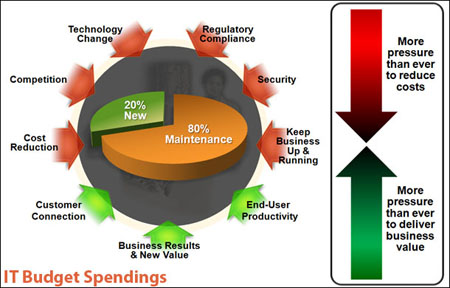The bulk of IT budgets is spent just “treading water” rather than adding new business value. The current economic climate and resulting pressure on IT budgets has made the task of just treading water, that much more difficult, while the need to add real business value to compete in difficult market conditions is even greater. The idea to Outsource Customer Support and Server Administration can help your IT department flip that equation, so that you can reduce costs on core workloads and realign IT resources to help your business compete in challenging market conditions. More than ever, you need to free up those “up and running” resources to help your company compete through IT! Consider the graphic below:

There are “good” and “bad” pressures on IT. The green arrows represent the good pressure: pressure to add new business value by increasing productivity, driving customer connections, etc. The red arrows represent the “bad” pressures: the necessary, day-to-day pressures that require lots of time, resources, and effort to address but that don’t necessarily push the business ahead. It’s these pressures that consume 80 percent of most IT budgets today, according to analysts; that’s a lot of investment spent on “standing still” when you’d rather be spending resources that add new business value and take the business further.
As companies grow, their IT infrastructures grow along with them. But more often, the pace of that growth is uneven, driven as much by the conditions under which the infrastructures operate as by the models they aspire to. You add an application here. You add functionality there. You add people across the board. Yet the more variables you add to your infrastructure, the harder it can be to manage and, more importantly, to keep secure.
So even as the costs for hardware and software are going down, the costs of managing and supporting your infrastructure are increasing. In today’s competitive times, outsourcing non-core activities makes a lot of business and economic sense. Organizations are realizing that they can’t provide each and every service to their clients. As a result, they are focusing more on their core competencies and relying on service providers to manage critical but non-core processes for them. Offshore technical support can no longer be treated as a peripheral process. It requires a experienced and dedicated support team who will work around the clock to deliver higher value to customers.
In addition to this, there are many more reasons why a company should consider outsourcing. Some of the reasons are outlined below:
- Because you need to focus more on core business activities
- Because you don’t have the time to do it yourself
- Because you want to avoid the cost of new technology
- Because you want to reduce your present operating costs
- Because you want to reduce capital costs of infrastructure
- Because you want to make the best use of competitive resources available worldwide
- Because you don’t have the skills to do it yourself
- Because you want to maximize customer satisfaction
- Because you want to benefit from the provider’s expertise in solving problems for a number of clients with similar requirements
In today’s globalized and networked economy, outsourcing has never been so easy or made so much business sense. The question is not “Why outsource?” but rather, “Why not?”.



